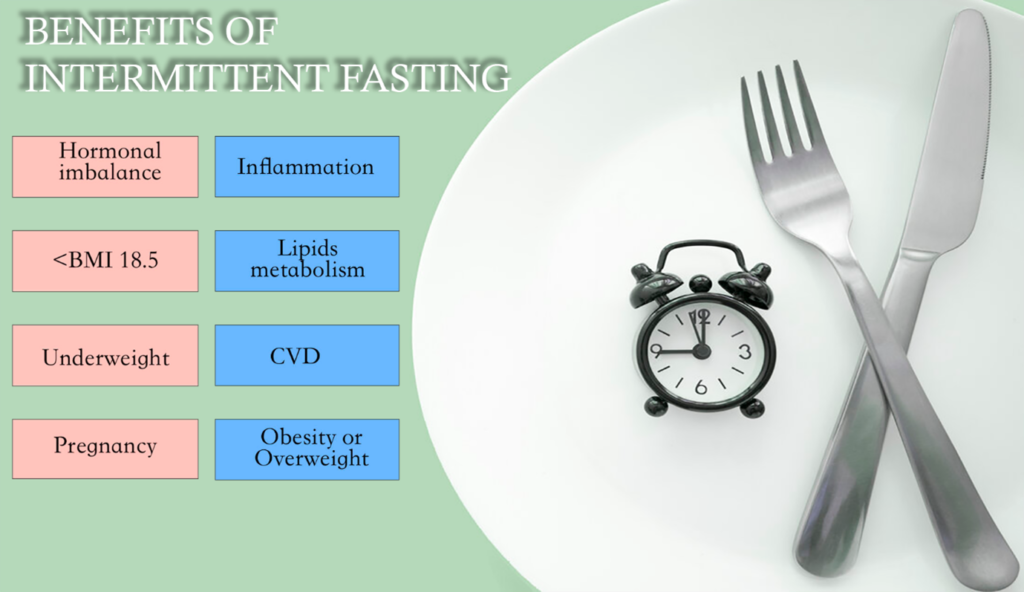With intermittent fasting, you just eat during a precise time. Study indicates fasting for a specific number of hours each day or consuming just one meal a couple of days a week may have fitness advantages.
Specialists note that even 50 years ago, it was more comfortable to keep a wholesome poundage in the United States. There were no computers, and TV displays bent off at 11 p.m.; people quit consuming because they headed to bed. Parts were much more miniature. More individuals performed and recreated out and, in public, got more training.
With the internet, TV, and other recreation open 24/7, many grown-ups and kids stay sharp for more extended hours to watch TV, scroll via social media, recreate fun, and chat online.
Excess calories and minor action can indicate a more increased chance of obesity, type 2 diabetes, heart condition, and other conditions. Scientific investigations indicate that periodic fasting may allow a change in these tendencies.
How does intermittent fasting outcome?
There are several various methods to do intermittent fasting, but they are all founded on selecting standard periods to eat and fast.
Mattson states that after hours without meals, the body depletes its sugar supplies and begins boiling fat.
Intermittent Fasting Timetables
It’s essential to review with your physician before beginning periodic fasting. Once you get his or her go-ahead, the real training is easy. You can choose a daily practice, which limits daily dining to one six- to eight-hour period each day.
Another intermittent fasting program, understood as the 5:2 course, affects eating regularly five days a week. An instance would be if you decided to eat usually every day of the week but Mondays and Thursdays, which would be your one-meal days.
Mattson’s study indicates that it can take two to four weeks before the body evolves used to periodic fasting. You might feel starved or grumpy while you’re obtaining utilized to the new way. But, he watches, and studies topics who make it via the adjustment time tend to adhere to the program because they see they feel more useful.
What can I eat during periodic fasting?
During the moments when you’re not consuming, moisture and zero-calorie drinks such as jet coffee and tea are allowed.
During your eating times, “eating generally” does not mean running wild. Study indicates that you’re not likely to lose poundage or get more benefits if you plug your feeding times with high-calorie junk meals, super-sized fried things, and pleasures.
But what some professionals like about periodic fasting is that it qualifies for a spectrum of other meals to be consumed and appreciated. Sharing good, healthy food with others and savoring the mealtime adventure adds happiness and keeps good fitness.

Intermittent Fasting Uses
Research indicates that the periodic fasting times do more than burn fat. Mattson describes, “When differences arise with this metabolic control, it involves the body and brainiac.”
Here are some periodic fasting help studies have shown so far:
- Feeling and remembrance. Investigations found that sporadic fasting increases active remembrance in animals and said memory in adult humans.
- Heart fitness. Intermittent fasting enhanced blood pressure and sleeping heart rates as well as other heart-related sizes.
- Physical version. Youthful men who fasted for 16 hours led to fat loss while preserving muscle group. Mice who were fed on alternate days offered better persistence in driving.
- Type 2 diabetes and obesity. In animal investigations, periodic fasting stopped obesity. And, in six brief reflections, obese grown-up humans lost weight via periodic fasting. Certain investigations discovered that some patients rehearsing periodic fasting with care by their doctors were capable of changing their requirement for insulin treatment.
- Tissue fitness. In animals, periodic fasting decreased tissue injury in surgery and enhanced effects.
Is intermittent fasting secure?
Some individuals try intermittent fasting for weight control, and others utilize the way to manage chronic disorders such as irritable bowel syndrome, increased cholesterol, or arthritis. But periodical fasting isn’t for everyone.
Before you attempt intermittent fasting, you should fit in with your direct care practitioner. Some individuals should run obvious of attempting intermittent fasting:
- Kids and teens under age 18.
- Females who are expectant or breastfeeding.
- Individuals with type 1 diabetes who carry insulin. While an increasing digit of clinical tests have demonstrated that periodic fasting is secure in individuals with type 2 diabetes, there have been no investigations in individuals with type I diabetes.
- Those with a record of eating upsets.
- It can be a lifestyle difference and one with help.
Hold on to reason that periodic fasting may have various impacts on other individuals. Speak to your physician if you begin sharing exceptional fear, headaches, sickness, or other signs after you start periodic fasting.
